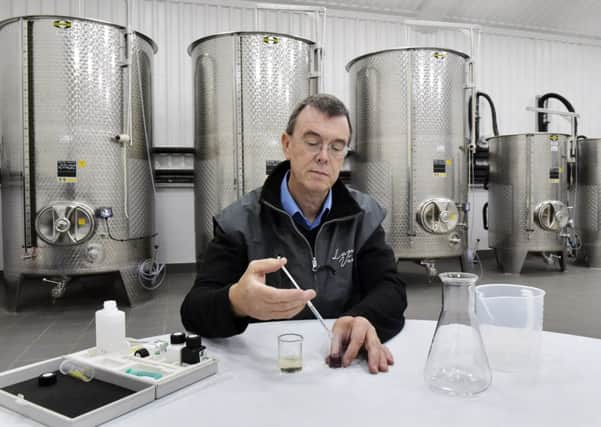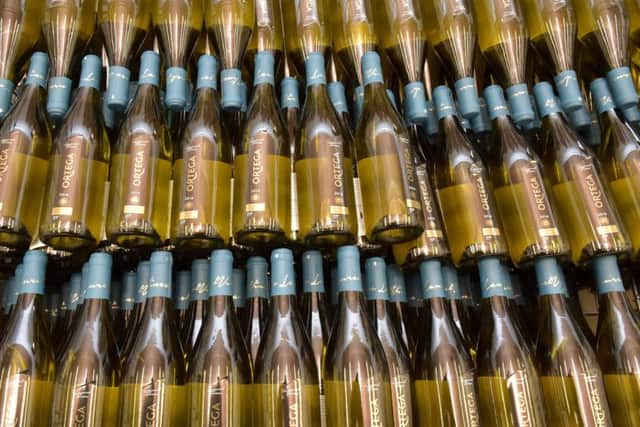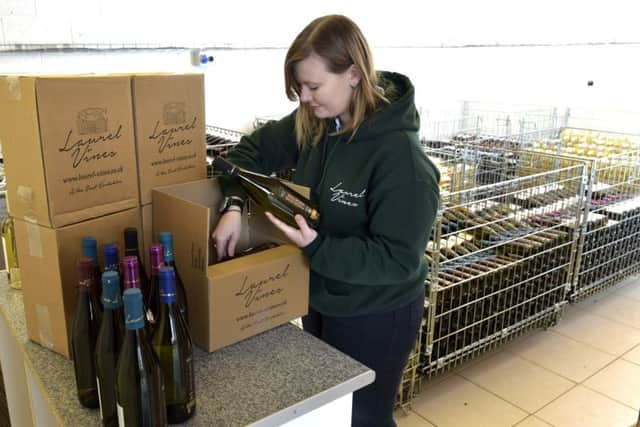Grapes go from vine to wine on the farm in Aike


Whether you like them or not there can be no denying they are catchy tunes that have stood the test of time. Fortunately, our wine drinking habits of the late 70s have broadened since then and what proved popular on our palates doesn’t appear to have had the similar longevity of appeal.
Wines such as Blue Nun and Liebfraumilch were all the rage in 1979, the year of the aforementioned hits, and were the first real signs of a country starting to accept wine drinking as a regular activity along mainland European lines. Today wine is as much a part of the weekly shop and we have become far more discerning.
Advertisement
Hide AdAdvertisement
Hide AdSupermarket shelves are now lined with platoons of bottles from nearly every region in the world. Consumers read about the wine’s compatibility with meals, its description and make a decision, many times on price but also sometimes just on how the bottle looks and another wine choice is made, plonked in the basket, bought and tried.


English or British wine hasn’t quite reached that mass market supermarket stage in any meaningful manner yet but over the past 20 years it has been quietly getting its act together in vineyards throughout England and Wales.
Yorkshire now has more than a handful of professional operations and the aspirations of those who run them are far in excess of simply being content to grow grapes and produce a small quantity. They are determined to make the county a recognised wine growing region on the world stage.
Laurel Vines based in Aike, between Driffield and Beverley, in East Yorkshire is run by father and daughter, Ian and Rebekah Sargent, who having planted their first vines in 2010-11 now have 10,000 vines across nine acres with steady growth planned for future years.
Advertisement
Hide AdAdvertisement
Hide AdIt’s not just a vineyard, Laurel Farm is also home to a winery, which means their crop travels no further currently than around 400 metres from vine to wine, although this carbon footprint may reach a heady 600 metres as more vines are grown.


“We’ve lived in Aike for 20 years and came here about seven years ago,” says Ian. ‘This was a typical old style mixed farm with a small dairy herd.
“We took on 15 acres at Laurel Farm and have since added to it with other parcels of land around the village taking us to nearly 40 acres.
“The land is predominantly heavy loam with chalk underneath that helps with drainage. The vines are running really well along the chalk layer.
Advertisement
Hide AdAdvertisement
Hide Ad“I’m always interested in what makes the difference between grape varieties and why they taste the way they do. Soil condition, the climate, sunlight hours and geographic location are all part but there are many other factors. Sometimes it is just down to your own management.”


Ian runs a successful electrical contracting company with his brother Neil which they started together in east Hull in 1991 and handles massive wiring systems for large scale projects in cities including London, Manchester and Birmingham.
“Having a technical background and adopting a logical approach helps in understanding why vines grow well or why they don’t. If we appreciate why things happen we can mitigate against them.
“We had one time when we had just started growing vines where we lost the vine buds at the foot of the vineyard slope where frost was rolling down.
Advertisement
Hide AdAdvertisement
Hide Ad“Once we knew we were able to do something about it and by use of fans we pulled the air from the floor blowing it skywards.”


In recent years, Laurel Vines has become one of England’s shining lights at wine’s top table with three bronzes at the UK Wine Awards; two in the English Independent Wine Awards; and last year carried off the title Best Wine Maker & Grower of the Year for the north of England.
“We started producing our first wines in 2013 and at the time our two white wine varieties sold out in three weeks.
“Wine isn’t like beer where you can brew another batch when you get short. In our case you have to wait for your next crop.
Advertisement
Hide AdAdvertisement
Hide Ad“We made 900 bottles of wine that first time. We’re now producing 10,000 bottles a year and that will grow, but we need to make sure we don’t get too far ahead of ourselves which is why we’re taking it one step at a time.
“What is clear though is that our wine is in demand, particularly our Ortega. It’s a dry white that already has a great reputation. Our Rondo rose wine is also well loved.”
Having tried both Ortega and Rondo while with Ian and Rebekah I can confirm what thousands have already experienced.
These Laurel Wines varieties have a clean, fresh taste that I will certainly be more than happy consuming in future.
Advertisement
Hide AdAdvertisement
Hide Ad“Great restaurants like The Pipe & Glass at South Dalton; 1884 Dock Street Kitchen in Hull; and Melton’s in York are just three of the top eating establishments that now have us on their wine lists. We’re keen to work with anyone who is as passionate as we are about British food and drink.
“The response we receive from people attending food festivals such as Beverley and Cottingham is overwhelming. People now really appreciate English wine and particularly Yorkshire wine more than ever.
“The English wine industry is on a high at the moment and we feel the next five years could see an even greater rise in popularity.
“We have our first red wines in the pipeline for next year and planted our first champagne varieties last year.
Advertisement
Hide AdAdvertisement
Hide Ad“It’s an exciting time to be involved and we’re delighted with the success we’ve had so far, but there’s so much more we feel we can achieve.”